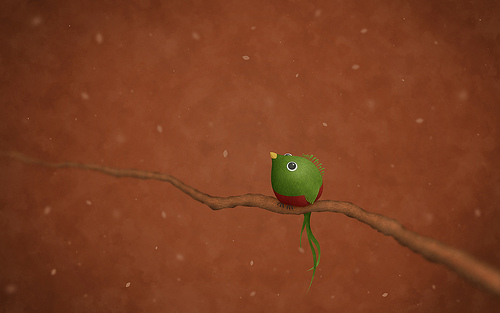I’m curious to see if wiping my box and installing 12.10 from scratch will make Chrome and Unity behave again. Although, Gnome 3 has been working fine since I switched.
Ubuntu 12.10 is Out


I found it strange that the article offers Elite 2 and Elder Scrolls as examples of games that generate their environments procedurally. Nethack comes to mind. But if you watch the video demo of A New Zero, the blocky graphics and soft music might remind you of another little game called Minecraft.
A 3D video game that creates a virtual world on-the-fly could change how blockbuster shoot-’em-up titles are built.
…
The idea of building gaming environments from code, known as procedural generation, is not new. Austin points to an early 1990s space simulation called Frontier: Elite 2, which procedurally generated a whole galaxy for exploration. The popular Elder Scrolls series of games uses procedural generation to draw many of its dungeons, which are then touched up by artists.
Got a tough coding task? Post it here with a cash bounty ($1-250) to incentivize your fellow hackers.

Like Captain Kirk in Star Trek II, the scurvy dogs of The Pirate Bay have steered their ship into the Mutara Nebula. “We tried it once your way, Khan. Are you game for a rematch? Khan … I’m laughing at the superior intellect.”
The Pirate Bay has made an important change to its infrastructure. The world’s most famous BitTorrent site has switched its entire operation to the cloud. From now on The Pirate Bay will serve its users from several cloud hosting providers scattered around the world. The move will cut costs, ensure better uptime, and make the site virtually invulnerable to police raids — all while keeping user data secure.
My old HP Core Duo Ubuntu server bit the dust last week. Seemed like a PSU issue since it booted once and ran OK for 10 minutes, but sadly, the oddball PSU in this HP case has no easy replacement. No, it’s not a normal ATX12V PSU. Whatever–a suitable replacement, must faster, was had via NewEgg. It threw me for a loop for a few hours, though. I installed Ubuntu 12.04 LTS with no issues, but then the damn thing wouldn’t boot unless I left the USB key in.
So, this seems like a known issue–use boot-repair, yadda yadda–but no, this seems to be something different. I thought I might need to mess with gparted, but I didn’t make a boot partition and I didn’t convert to non-GPT. I noticed in gparted that I had a first /sda1 partition that was FAT32 and flagged for boot. I’m thinking this was a recovery partition for this little Acer box that came with Windows 7. Well, I wiped all the partitions and re-ran the Ubuntu install. Joy! It got the partitions right and boots on its own.